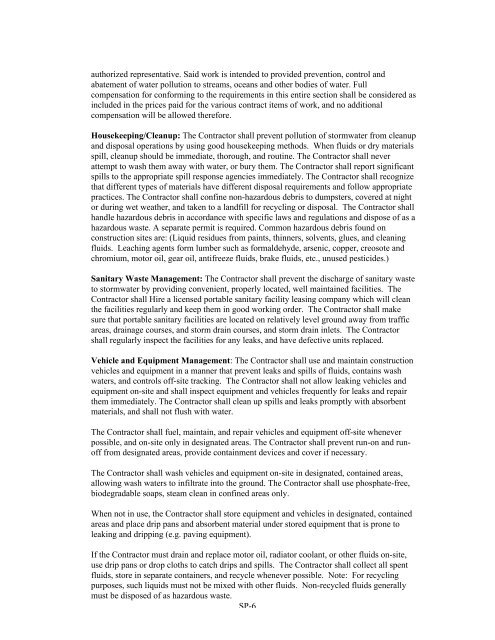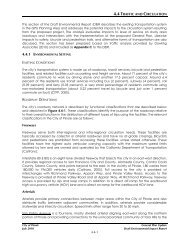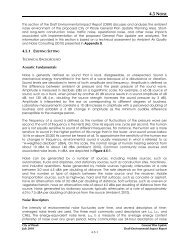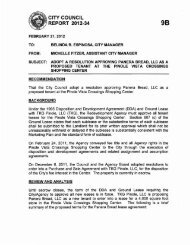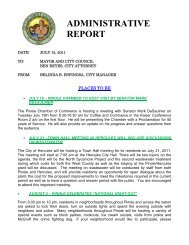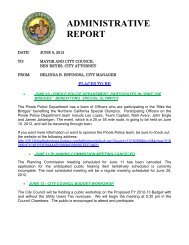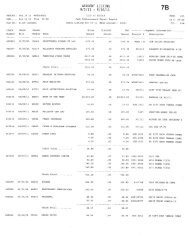CITY OF PINOLE Sewer Rehabilitation Program FY 07 – 08 PHASE 2
CITY OF PINOLE Sewer Rehabilitation Program FY 07 – 08 PHASE 2
CITY OF PINOLE Sewer Rehabilitation Program FY 07 – 08 PHASE 2
You also want an ePaper? Increase the reach of your titles
YUMPU automatically turns print PDFs into web optimized ePapers that Google loves.
authorized representative. Said work is intended to provided prevention, control and<br />
abatement of water pollution to streams, oceans and other bodies of water. Full<br />
compensation for conforming to the requirements in this entire section shall be considered as<br />
included in the prices paid for the various contract items of work, and no additional<br />
compensation will be allowed therefore.<br />
Housekeeping/Cleanup: The Contractor shall prevent pollution of stormwater from cleanup<br />
and disposal operations by using good housekeeping methods. When fluids or dry materials<br />
spill, cleanup should be immediate, thorough, and routine. The Contractor shall never<br />
attempt to wash them away with water, or bury them. The Contractor shall report significant<br />
spills to the appropriate spill response agencies immediately. The Contractor shall recognize<br />
that different types of materials have different disposal requirements and follow appropriate<br />
practices. The Contractor shall confine non-hazardous debris to dumpsters, covered at night<br />
or during wet weather, and taken to a landfill for recycling or disposal. The Contractor shall<br />
handle hazardous debris in accordance with specific laws and regulations and dispose of as a<br />
hazardous waste. A separate permit is required. Common hazardous debris found on<br />
construction sites are: (Liquid residues from paints, thinners, solvents, glues, and cleaning<br />
fluids. Leaching agents form lumber such as formaldehyde, arsenic, copper, creosote and<br />
chromium, motor oil, gear oil, antifreeze fluids, brake fluids, etc., unused pesticides.)<br />
Sanitary Waste Management: The Contractor shall prevent the discharge of sanitary waste<br />
to stormwater by providing convenient, properly located, well maintained facilities. The<br />
Contractor shall Hire a licensed portable sanitary facility leasing company which will clean<br />
the facilities regularly and keep them in good working order. The Contractor shall make<br />
sure that portable sanitary facilities are located on relatively level ground away from traffic<br />
areas, drainage courses, and storm drain courses, and storm drain inlets. The Contractor<br />
shall regularly inspect the facilities for any leaks, and have defective units replaced.<br />
Vehicle and Equipment Management: The Contractor shall use and maintain construction<br />
vehicles and equipment in a manner that prevent leaks and spills of fluids, contains wash<br />
waters, and controls off-site tracking. The Contractor shall not allow leaking vehicles and<br />
equipment on-site and shall inspect equipment and vehicles frequently for leaks and repair<br />
them immediately. The Contractor shall clean up spills and leaks promptly with absorbent<br />
materials, and shall not flush with water.<br />
The Contractor shall fuel, maintain, and repair vehicles and equipment off-site whenever<br />
possible, and on-site only in designated areas. The Contractor shall prevent run-on and runoff<br />
from designated areas, provide containment devices and cover if necessary.<br />
The Contractor shall wash vehicles and equipment on-site in designated, contained areas,<br />
allowing wash waters to infiltrate into the ground. The Contractor shall use phosphate-free,<br />
biodegradable soaps, steam clean in confined areas only.<br />
When not in use, the Contractor shall store equipment and vehicles in designated, contained<br />
areas and place drip pans and absorbent material under stored equipment that is prone to<br />
leaking and dripping (e.g. paving equipment).<br />
If the Contractor must drain and replace motor oil, radiator coolant, or other fluids on-site,<br />
use drip pans or drop cloths to catch drips and spills. The Contractor shall collect all spent<br />
fluids, store in separate containers, and recycle whenever possible. Note: For recycling<br />
purposes, such liquids must not be mixed with other fluids. Non-recycled fluids generally<br />
must be disposed of as hazardous waste.<br />
SP-6


